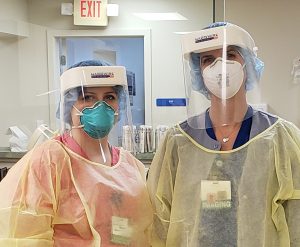
BERLIN – In an effort to combat the spread of COVID-19, Hardwire LLC is now manufacturing face shields for medical personnel.
The Pocomoke-based Hardwire is now producing protective face shields to provide hospital staff with added defenses as the ongoing coronavirus crisis continues. The company worked with front-line doctors and nurses at Atlantic General Hospital (AGH) to design and test the shields.
“’Enhancing the survivability of humans’ has not only been Hardwire’s mission statement since September 11, 2001, but is part of our DNA,” Hardwire CEO George Tunis said. “We couldn’t sit idly by while heroic doctors, nurses and other emergency personnel battling this deadly virus don’t have all the equipment they need.”
According to Hardwire, the company created a new production line in less than a week to help address the growing need for protective equipment in hospitals.
Michael Franklin, president and CEO of Atlantic General, said Tunis initially called to talk about N95 masks, which he hoped Hardwire could produce.
“He was having difficulty getting material,” Franklin said. “With the challenge of supplies we talked about ways we could extend our current supply. That’s where the face shields came in.”
Hardwire produced a prototype and delivered it to AGH. Caregivers there tested it, using markers to identify changes that would make it more comfortable and better fitting. Hardwire quickly made the adjustments.
“We went from the initial prototype to usable shields in less than a week,” Franklin said.
The Hardwire Face Shield is lightweight, weighing less than two ounces, comfortable and doesn’t fog up. The value of it at AGH, according to Franklin, is the fact that it enables caregivers to keep the same N95 mask on all day, since the mask is protected by the shield. Without the shield, caregivers have to change masks between patients. While it’s difficult to quantify exactly the number of masks that are now being saved, Franklin said it was a substantial amount.
“The pace of reduction in inventory is less than it was before,” Franklin said.
Hardwire created 100 shields the first week, 50 of which went to AGH. The company is scaling to a production capacity of about 6,000 units a day. According to Tunis, production goals are set at closer to 60,000 units per day as demand dictates.
“This virus is simple and clever,” Tunis said. “We must also be the same, but much faster. The speed in Hardwire’s case comes from the efficient design and carefully selected supply chain partners. Our defense work has taught us that speed matters and you should listen to your troops, or in this case, our nurses and doctors. We will do everything we can to supply what they need.”
At AGH, Franklin said Hardwire’s efforts had increased the hospital’s supply of protective equipment at a key time, as hospital staff are interacting with patients that have or are presumed to have coronavirus.
“It gives health care workers more confidence they’re being protected, which allows them to focus on doing what they need to do for the patients,” he said.
Though many in the community have offered to sew masks for hospital workers, Franklin said that those masks were not ideal unless they were made with the right material. He added that health care workers nevertheless appreciated the community’s efforts and were using donated head caps, as they were helpful.
“Anything that demonstrates support from the community is a positive thing,” he said.
Franklin said that because there were widespread shortages of certain types of protective equipment, AGH was being cautious at this point. The powered air purifying respirators (PAPRs), for example, will not be used until necessary.
“There are certain types of personal protective equipment there is a widespread shortage of so we’re being careful with how much we distribute because we haven’t seen the level of COVID here they’re seeing in other places like New York,” Franklin said.
When asked if there was anything else he wanted to share with the public, Franklin had just three words.
“Wash your hands,” he said.
He said that currently, AGH was experiencing only half the emergency room visits it typically did this time of year. There are also fewer patients in the hospital because elective surgeries have been postponed.
“That is creating capacity which is a good thing for when we start seeing an uptick in the people affected by COVID,” he said.

